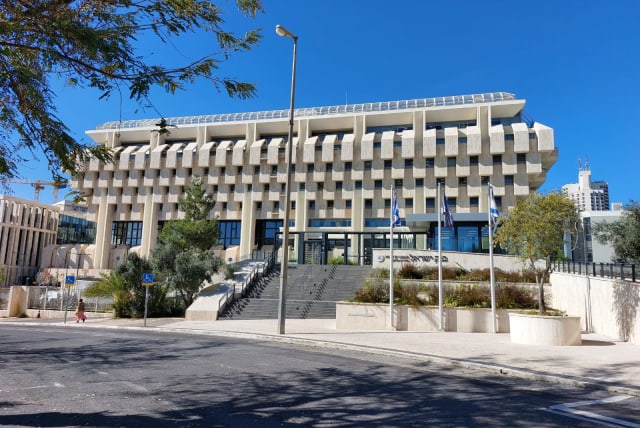Bank of Israel holds key interest rate steady

Gafni blasts Yaron as ‘bad governor’
The Bank of Israel kept short-term borrowing rates unchanged for a fourth straight time on Monday as policymakers remained focused on maintaining financial stability during the war.
The central bank held its benchmark rate ILINR=ECI at 4.75% - its highest level since late 2006. It had raised rates 10 straight times in an aggressive tightening cycle that has taken the rate from 0.1% last April before pausing in July and again in August and October.
All 14 economists polled by Reuters had forecast no rate change.
“The war is having significant economic consequences, both on real economic activity and on the financial markets,” the BoI said in a statement following its decision.
“There is a great amount of uncertainty with regard to the expected severity and duration of the war,” it said.
The central bank cut its forecasts for economic growth in 2023 and 2024 in view of the impact of the war, now seeing an expansion of 2% next year, down from 2.8% a month ago.
Officials have previously cautioned that steep rate cuts at the moment would weaken the shekel and push up inflation.
In its statement, the central bank pointed to the conditions needed for it to provide a more supportive monetary policy.
“The interest rate path will be determined in accordance with developments in the war and the uncertainty derived from it,” the BoI said.“Insofar as the recent stability in the financial markets becomes entrenched and the inflation environment continues to moderate toward the target range, monetary policy will be able to focus more on supporting economic activity.”
Gafni attacks Bank governor
Meanwhile, the more than year-long rift between Israel’s powerful parliamentary Finance Committee chairman Moshe Gafni and central bank governor Amir Yaron escalated on Monday after Gafni said the Bank of Israel chief did not deserve a second term.
Gafni, head of the ultra-Orthodox United Torah Judaism Party, has been a staunch critic of Yaron since mid-2022 when the central bank embarked on an aggressive interest rate hike cycle to fight high inflation.
Against the backdrop of the economic uncertainty stemming from the war against Hamas, Prime Minister Benjamin Netanyahu last week offered Yaron a second five-year term, which he accepted. It now awaits cabinet approval.
“His (first) term is characterized by hurting the weak, and constantly raising the interest rate and the burden on the public is terrible,” Gafni said at the start of the Finance Committee meeting. “He is not a good governor; he is a bad governor. The government is making a bad decision.”
Gafni’s UTJ party represents a constituency that is largely poor - very large families and only half of the men working, with the other half focused on religious study.
The Bank of Israel responded to Gafni, saying it was “important that the dialogue between the Knesset (parliament) and the government and public institutions such as the Bank of Israel be professional and respectful and not be characterized by toxic and divisive discourse, which is inappropriate, certainly at this time.”
The interest rate was raised to 4.75% from 0.1%, leading to a spike in mortgage and other loan rates, while interest on consumer bank accounts initially barely rose, and Gafni believed that the Bank of Israel did not push banks enough to help consumers. Last month, at the outset of Israel’s war with Hamas, he also called for rate cuts.
Israel’s inflation rate has eased to 3.7% from above 5% and remains above the government’s annual target of 1%-3%.
The central bank said that price stability was a condition for the normal operation of the economy and that interest rate hikes had shielded it from soaring inflation that would primarily hurt the weakest segments and damage families and businesses even more.
“It would be appropriate for the chairman of the Finance Committee to see the good of the entire economy, and to be knowledgeable about the basics of the economy and also what is happening outside of Israel,” the Bank of Israel said.
“Then, he would have discovered that the actions of the central bank of Israel and the governor, in dealing with inflation, COVID and the war [with Hamas], are being praised by all international professionals.”
Jerusalem Post Store
`; document.getElementById("linkPremium").innerHTML = cont; var divWithLink = document.getElementById("premium-link"); if (divWithLink !== null && divWithLink !== 'undefined') { divWithLink.style.border = "solid 1px #cb0f3e"; divWithLink.style.textAlign = "center"; divWithLink.style.marginBottom = "15px"; divWithLink.style.marginTop = "15px"; divWithLink.style.width = "100%"; divWithLink.style.backgroundColor = "#122952"; divWithLink.style.color = "#ffffff"; divWithLink.style.lineHeight = "1.5"; } } (function (v, i) { });


